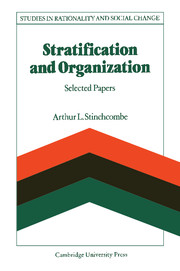Book contents
- Frontmatter
- Contents
- Acknowledgments
- 1 Rationality and social structure: an introduction
- PART I STRATIFICATION
- PART II ORGANIZATIONS
- PART III SOCIOLOGY AS A PROFESSION
- 13 On getting ‘hung-up’ and other assorted illnesses
- 14 Review of Max Weber's Economy and Society
- 15 Merton's theory of social structure
- 16 A structural analysis of sociology
- 17 On journal editing as a probabilistic process (Co-authored with Richard Ofshe)
- 18 The mathematical biology of survey research centres
- 19 Should sociologists forget their mothers and fathers?
- Bibliography
- Name and place-name index
- Subject index
15 - Merton's theory of social structure
from PART III - SOCIOLOGY AS A PROFESSION
Published online by Cambridge University Press: 06 July 2010
- Frontmatter
- Contents
- Acknowledgments
- 1 Rationality and social structure: an introduction
- PART I STRATIFICATION
- PART II ORGANIZATIONS
- PART III SOCIOLOGY AS A PROFESSION
- 13 On getting ‘hung-up’ and other assorted illnesses
- 14 Review of Max Weber's Economy and Society
- 15 Merton's theory of social structure
- 16 A structural analysis of sociology
- 17 On journal editing as a probabilistic process (Co-authored with Richard Ofshe)
- 18 The mathematical biology of survey research centres
- 19 Should sociologists forget their mothers and fathers?
- Bibliography
- Name and place-name index
- Subject index
Summary
Of all contemporary theorists of social structure, Merton has had the greatest impact on empirical research. Investigators find it easy to understand how Merton's general ideas about social structure imply hypotheses about the pattern of behavior and the pattern of associations between variables in the setting in which their research is conducted. The argument of this essay is that this is due to the common logical and substantive character of all of Merton's theories of social structure. I would further argue, though I will not defend it in detail here, that this logical and substantive character of Merton's theories distinguishes him from almost all the other contemporary currents of social theory: Parsonian, symbolic interactionist, the Linton-Nadel kind of rôle theory, functionalism of the non-Mertonian kind. The main exceptions seem to me to be Homans and the exchange theory tradition, and to some degree the balance theory tradition, which have a similar logical structure and similar empirical fruitfulness.
What I will be trying to do, then, is to codify Merton's codifications, to outline the principles behind the choice of those elements in a theoretical tradition that he chose as central and worth codifying and those he ignored. The test case for the success of my effort is his approach to the social structure of science, where he was choosing freely what to pay attention to because there was not much to codify.
- Type
- Chapter
- Information
- Stratification and OrganizationSelected Papers, pp. 290 - 317Publisher: Cambridge University PressPrint publication year: 1986
- 1
- Cited by

